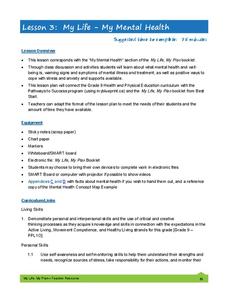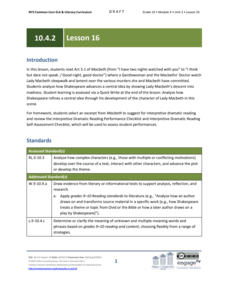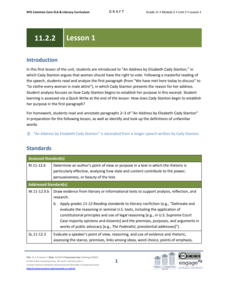Curated OER
Acid Rain
Create a simulation of acid rain in your classroom with lemon juice and bean plants to help kids study the effects of pollution on plants. In addition, learners will listen to a story and write responses based on guiding questions.
Geography 360°
Poetry Writing
Put the tips and tricks in this guide into practice in order to encourage your pupils to blossom into poets. A wonderful reference material for teachers, this packet includes definitions of poetic terms and forms as well as step-by-step...
Curated OER
Adding & Subtracting (Combining) Integers
Maintain a positive atmosphere in your math class with this fun lesson on adding and subtracting integers. After first explaining the rules for combining positive and negative numbers, this resource uses a comic strip to guide students...
Outdoor Learning Center
Outdoor Survival
Which of the following can you survive without for the longest time: water, food, or a positive mental attitude? The answer may surprise you. Guide learners of all ages through games, activities, and discussions about surviving in the...
Curated OER
Committing to Respect: Lessons for Students to Address Bias
Here's a guide designed to build safe, respectful learning environments, and to build understanding of the value of diversity through lessons packed with activities for specific grade levels.
Education Outside
Birder - Watcher
Take the class outside with a bird watching lesson. Young ornithologists participate in an outdoor activity that guides them on how to observe and study the feathered animals. After walking around school campus, bird watchers provide a...
Utah Education Network (UEN)
Self-Concept: Self-Esteem
Most teenagers struggle with self-image and self-esteem. Guide them through these stormy waters with a series of activities focused on positive messages, true friendship and support, and self-concept.
West Contra Costa Unified School District
Expository Writing in Math
Pupils engage in an activity where one partner reads directions while the other follows those directions to complete a math task (such as bisecting an angle). As a reflection, they examine products to see what information the best...
Constitutional Rights Foundation
History of Immigration From the 1850s to the Present
The Statue of Liberty may embrace the huddled masses of the world, but has American society always joined in? After young historians read a passage about the history of American immigration in the 19th and 20th centuries, focusing on...
Constitutional Rights Foundation
Refugees: International Law and U.S. Policy
Discover the ways America has opened its borders to international refugees, and the ways other countries have been more or less welcoming, with an informational passage about United States and international policies on refugees. After...
Hastings Prince Edward Public Health
My Life—My Mental Health
Between peer pressure, an onslaught of hormones, and brand new responsibilities, the teenage years can be emotionally volatile. Equip young adults with coping mechanisms and a safe place to discuss their feelings with a guided lesson...
iCivics
Lesson 1: Journalism
Extra! Extra! Do your pupils know what it takes to be a good journalist? Young news hounds explore the world of journalism through a series of activities that focus on ethical reporting. Learners read, evaluate, and investigate popular...
iCivics
Lesson 2: Misinformation
Fake news is a hot topic right now ... but what is it? Intrepid young investigators track down the facts that separate journalistic mistakes and misinformation through reading, research, and discussion. Part three in a five-lesson series...
iCivics
Lesson 3: Bias
How do journalists balance bias and ethical reporting? The final lesson in a series of five from iCivics examines the different types of bias and how they affect the news we read. Young reporters take to the Internet to find examples of...
Heritage Foundation
Congress's Economic Powers
Join Congress as they assess their economic abilities for spending—and as they discover their limits. High schoolers use an educational resource to explore Congress's economic powers and learn to apply these concepts to their everyday...
WE Charity
High School–Module 2: Circular Economy and Nature
Everyone's heard the popular slogan reduce, reuse, recycle, but there may be a better way to talk about sustainability. Using the second lesson from the five-part WE Are Innovators—High School Modules series, learners explore issues...
Serendip
Changing Biological Communities – Disturbance and Succession
After cutting down a forest to make a farm, how long would it take the environment to turn an abandoned farm back into a forest? Scholars study this exact scenario while they interpret many charts and graphs of the changing ecosystems as...
EngageNY
Grade 10 ELA Module 4: Unit 2, Lesson 12
How do the Three Witches' interactions with Macbeth advance the plot of Shakespeare's Macbeth? Learners complete a Quick Write to answer the question. They also participate in a whole-class dramatic reading of Act 4.1.
EngageNY
Grade 10 ELA Module 4: Unit 2, Lesson 15
What goes around, comes around. Using the resource, pupils read Act 4.3 of Macbeth, in which Macduff and Malcolm plan to attack Macbeth. Scholars then hold a discussion and complete writing activities to analyze Shakespeare's structural...
EngageNY
Grade 10 ELA Module 4: Unit 2, Lesson 16
How do complex characters develop throughout a text? Pupils read Act 5.1 from Shakespeare's Macbeth, which depicts Lady Macbeth's descent into madness. Using discussion and writing exercises, scholars analyze how Shakespeare develops...
EngageNY
Grade 11 ELA Module 2: Unit 2, Lesson 1
How did Elizabeth Cady Stanton use rhetoric to convince others of her views? Scholars begin reading "An Address by Elizabeth Cady Stanton," which argues that women should have voting rights. Pupils complete a Quick Write to analyze how...
EngageNY
Grade 11 ELA Module 2: Unit 2, Lesson 9
How do authors employ specific word choices to describe complex relationships? Scholars read and analyze the first stanza from Audre Lorde's contemporary poem "From the House of Yemanjá." Pupils determine the meanings of figurative and...
EngageNY
Grade 11 ELA Module 2: Unit 1, Lesson 15
Scholars read paragraphs 13 and 14 of "Of Our Spiritual Strivings" and analyze Du Bois's chapter conclusion. Writers revisit their quick write assignments from the previous lesson plan and revise or expand them as needed.
EngageNY
Development of the Plot: Impending Danger and Turmoil
Danger! Scholars look closely at two poems, 'TV News' and 'Closed Too Soon.' While reading, learners think about Ha's country's increasing dangers and conflict. They record their thoughts in graphic organizers and discuss what details...
Other popular searches
- Guided Reading
- Guided Reading Comprehension
- Flat Stanley Guided Reading
- Guided Reading Lesson Plans
- Guided Reading Strategies
- Guided Reading Lessons
- Guided Reading Activities
- Guided Reading Fluency
- Dinosaur Guided Reading
- Guided Reading Elementary
- Guided Reading Lessons Plans
- Active Reading Guide

























